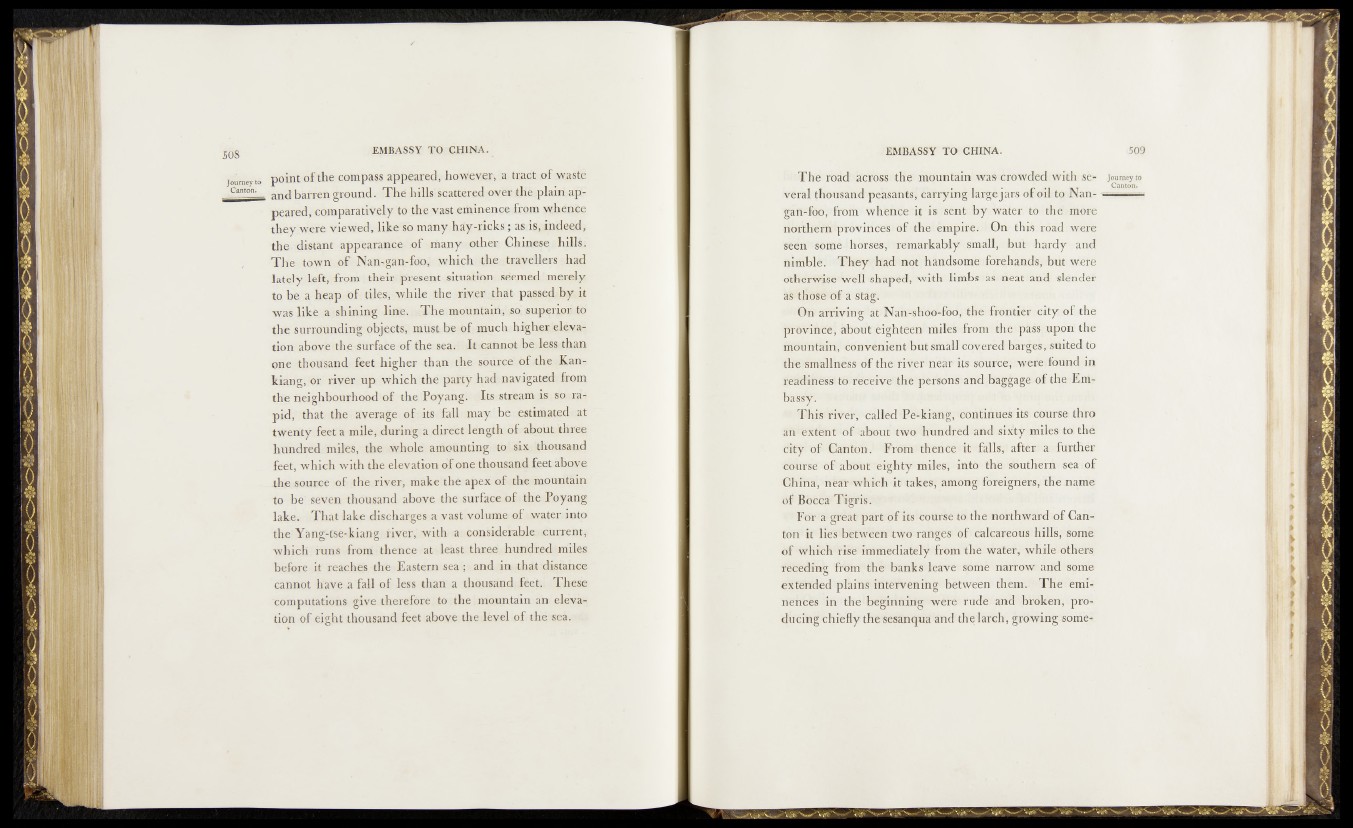
Journey
Canton
to point of the compass appeared, however,! a traofe.ofwaste
‘s s . and barren ground c T h e hills'
peared, comparatively to the vast eminenc^fiom w.hdnee
they were viewed^, like so many hay-riqks ; as.is>indeed,
the^idistant appearance .of many other Ghinef^fhillsj
T h e : town o f Nan-gan-foo, which the travellers had
lately left, from | thfeir |îresent situ;ation seemed merely
to be a heap o f tiles, while the river that passedby.it
was like a shining line- KThe mountain, so superior-to
the surrounding objects, must be o f much higherclevan
tion above the surface o f the seas It cannot beijfasstthan
one thousand feet higher than the source o f the Kan-
kiang, or river up which thé party had?navigatedvfrom
the neighbourhood o f the Poyang. Its stream is souraî
pid, that the average o f its fall may:be estimated ;at
twenty feet a mile, during a direct lengthsofyabout>three
hundred miles, the whole amounting to six thousand
feet, which with the elevation o f one thousandJfcet: above
fhe .source of the river, make thé apex o f the mountain
to be' seven thousand above the surfaces of the Poyang
lake. That fake discharges a vast v©l»me of^®ater.]into
the Yang?-tse-kiang river,' with- a considerableucnrrent,
which runs from thencigvat - least thoee hnndred tmMef
before it reaches the Eastern sea ; ; and in-.that distance
cannot have a fall of less than a thousand: feet,. These
computations give therefore. to .th e . mountain an elevation
o f eight thousand feet above the lével o f the sea. .
T h e rbddï&terbssi the mountain‘was crowded; with?,sé- joumeyto
vCral thonsand^easantól earrymgdar.gejars of oil to Nan- v.,
gân- fop, -yhëfrde dt i'stfs-inti- foywkafeer. to1} th d | me re
riodherÈL'îprôvi'rlceisîof théklmpSte©/ ' On thisdbad Were
seéh’ -sótö'e iho%sö^,dramarkably small, but »hardy- and
nimble;- T h e y .had mot handsomeSjfoMhând^bdfe.wiéfo
öthervfise - well ‘shapitf, with limbs'fas neatfand siéndef
aS W dtPSf à{s‘tigJbw
On arrivÿh^datf’Nah^hôd^fodyÈfee'fronbièi? city.of; >the
^rÔviné’é! fefôëut eighteen röilëSxfrom t?he;pass, upon? tfae
mountain^,' éOÉPvénient but smàèli t?qyerëdt b b suited to
thelsmallrfdsS-fof the riverInîéâ^its^sêSarbfaif.'weifeifound in
reàdinësSî CëUfbceiveythe persons »and bag^agesdf the Em?
b aw ^ 1'^
T h is !fi^ eH °d al^ d?fe-kian§|Cforitinuek! itsr course! thro
ardiéXthnfiM $$àboutbtWô ■hun'dTedaahd» Sidt^miles-. to; thé
dlt-ÿdbf'- C a n td ^ ' F rôM’ th en eb« it^fallSjï after toofuEtfaêr
«bifrtfe >öf about eighty miles, into the' sbutfrernv^éö1 of
Ghina, nëaï -which it takes, among foreigners* the .name
Ô# Bbcèâ Tigpfe^9
v s-pördi part-of its‘cbui?se td the'northward, of Cah%
ton it'd'ié^between'-twoïf’Mge'sï.êfïcaleafÊous hills, some
o f which' rise immediately from fh’e water, whife'others
^ëfeëdia^ ffbrn thê banks dtané narrownaifd some
extended plains intervening bètw^ü'-Ijhém’.t^The. eroi-
tféhéès in the begirining iftfefefarrH broken,iproducing
chiefly the Sesanq.ua and the larch,